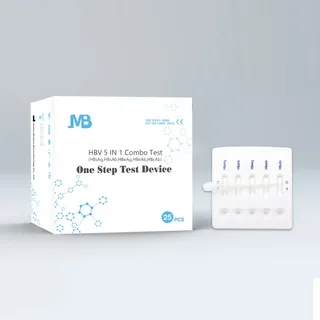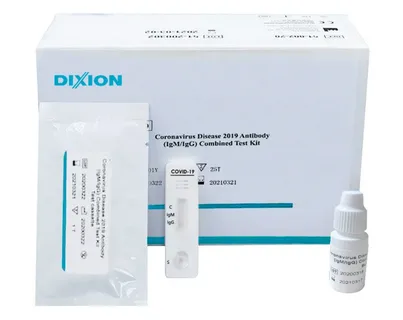Test kits have become essential in modern healthcare, providing quick and convenient ways to diagnose various conditions from the comfort of one’s home. However, with so many available options, it can be overwhelming to navigate through the different types and understand their accuracy and reliability. This blog post will demystify combination test kits and provide the information you need to know to make informed decisions about their use.
The Importance of Test Kits in Modern Healthcare
Test-kits’ value within the healthcare sector cannot be overstated in today’s fast-paced world. These kits have revolutionized how individuals engage with healthcare services, providing a bridge for early detection and monitoring of health conditions from the convenience of home. This not only aids in prompt intervention but also significantly reduces the burden on traditional healthcare systems. Test kits enable people to take proactive steps towards managing their health, which is particularly beneficial in areas with limited access to healthcare facilities or for those who face mobility challenges.
The advent of test kits has also facilitated a shift towards personalized healthcare, where individuals can tailor their health monitoring and management based on specific needs. This bespoke approach is crucial in managing chronic conditions, where regular monitoring can lead to better health outcomes. Moreover, the accessibility of test kits encourages a greater awareness and understanding of one’s health, fostering an environment where informed decisions can be made about lifestyle and healthcare choices.
By breaking down barriers to health monitoring and diagnosis, test kits contribute significantly to preventative healthcare. They act as an early warning system, allowing for timely medical advice and treatment, which is vital for conditions where early detection can significantly influence the effectiveness of treatment. Integrating test kits into healthcare routines exemplifies a significant advancement in our approach to health and wellbeing, underscoring their indispensable role in modern healthcare practices.
 Understanding How Test-Kits Work
Understanding How Test-Kits Work
To understand test-kits’ functionality, it’s crucial to grasp the underlying mechanisms they use to deliver results. At their core, these kits are designed for simplicity, enabling users to carry out complex diagnostic tests without needing specialized laboratory equipment. The fundamental process involves collecting a sample – whether it’s blood, urine, saliva, or even a breath sample – and applying it to the test device according to the instructions provided.
Test-kits’ magic lies in their ability to detect specific biological markers or molecules associated with certain health conditions. This is achieved through various scientific techniques, one of the most common being lateral flow assays. This method uses capillary action to move the sample across a test strip that contains antibodies or antigens specific to the target marker. If the target is present, a visible signal, often a colored line, appears.
Another widely used technique is the enzyme-linked immunosorbent assay (ELISA), which involves an enzyme reaction to produce a measurable signal, typically a change in color, indicative of the presence or quantity of a substance. Molecular diagnostics, including Polymerase Chain Reaction (PCR), is a more sophisticated approach, amplifying the DNA or RNA of pathogens to detectable levels, thus confirming their presence or absence in the sample.
Each test kit is meticulously designed to ensure that, when used correctly, it can offer reliable insights into one’s health status directly from home.
Types of Test Kits Available on the Market
Navigating through the plethora of test kits available in today’s market reveals a vast array designed to cater to a wide spectrum of health concerns and needs. From diagnosing infectious diseases to understanding genetic predispositions, the diversity in test kits is substantial. Among the most commonly utilized are pregnancy tests, which offer quick results about potential conception, and ovulation kits that assist individuals in identifying their most fertile days.
In addition, allergy test kits provide insights into specific allergens that may affect one’s health, whilst genetic testing kits delve deeper into one’s lineage and can uncover predispositions to particular health conditions. The advent of COVID-19 has also seen a surge in the availability of virus detection kits, which have become crucial in managing and controlling the spread of the virus. For those monitoring chronic conditions, glucose monitoring kits and blood pressure test kits are indispensable tools that offer convenience and autonomy in daily health management.
Sexual health is another area where test kits have made significant inroads, with kits available for the detection of sexually transmitted infections (STIs), allowing for privacy and ease of use. Each type of test kit is specifically designed for self-administration and requires different sample types, such as blood, urine, saliva, or even breath. The choice of test kit should be guided by the specific health condition or concern one is addressing, ensuring that the selected kit is fit for purpose and meets the individual’s health monitoring requirements.
The Accuracy and Reliability of Test-Kits
One of the foremost concerns when considering the purchase and use of test kits is their accuracy and reliability. These factors hinge on various aspects, such as the quality of the manufacturing process, the test’s specificity and sensitivity towards the target condition, and the users correct handling and interpretation of the test. Manufacturers must adhere to stringent regulatory standards to ensure these kits meet the high accuracy and reliability expected for medical devices.
The sensitivity of a test kit refers to its ability to correctly identify those with the condition (true positive rate), whereas specificity relates to correctly identifying those without the condition (true negative rate). An ideal test kit would have both high sensitivity and specificity, minimizing the chances of false positives and negatives. However, no test is infallible; the context in which the test is used and the prevalence of the condition in the population being tested can affect the overall reliability of results.
Users must follow the provided instructions meticulously. Deviations in the collection, storage, or handling of the sample can compromise test accuracy. It is also advisable to confirm the results of at-home test kits with a healthcare professional, especially for conditions that require timely medical intervention. Understanding these facets can aid individuals in making more informed decisions regarding their health monitoring practices.
Best Practices for Using Combination Test Kits at Home
When employing combination test kits at home, it is pivotal to approach the process with diligence and an understanding of the best practices that ensure accuracy and safety. Initially, one must ensure the test kit is within its expiry date and has been stored according to the manufacturer’s guidelines, as deviations can impair the kit’s reliability. Before use, thoroughly reading and understanding the instructions is crucial; this includes recognizing the specific sample required and the method of its collection, whether it be a blood, urine, or saliva sample.
Preparing the testing area is essential, ensuring it is clean and free from contaminants that could skew the results. Personal preparation, such as washing hands before collecting a sample, is fundamental to prevent cross-contamination. During the sample collection and testing phases, meticulous adherence to the instructions prevents procedural errors that could compromise the outcome. After conducting the test, interpreting the results accurately is vital.
Many test kits come with a guide or a reference for understanding the outcome. If the results are ambiguous or raise concerns, consulting with a healthcare professional is advisable for clarification and potential further testing. Additionally, maintaining a record of the test results can be helpful for monitoring purposes or future consultations with healthcare providers. Following these best practices ensures the efficacy and safety of using test kits at home, contributing to more informed healthcare decisions.
Legal and Ethical Considerations in Test-Kit Use
Navigating test kits requires a conscientious understanding of the legal and ethical frameworks governing them. The landscape is complex, as regulations can vary significantly by region and for the type of test kit in question. It is paramount for users to be aware of the legal stipulations surrounding the acquisition and application of test kits, particularly those that are traditionally confined to professional healthcare settings. Ethically, using test kits at home raises questions about privacy, data security, and the potential for misinterpretation of results without professional guidance.
Individuals should ensure they obtain test kits from reputable sources and consider the implications of sharing results with parties outside of an experienced healthcare context. Moreover, the ethical responsibility extends to adhering to instructions meticulously to avoid erroneous results, which could lead to further health complications or unnecessary anxiety. In summary, users must tread carefully within the bounds of legal and ethical considerations, maintaining vigilance over the privacy and accuracy of the health data generated through these test kits.
The Future of Test-Kits: Trends and Innovations
The trajectory of test-kit technology is on an exhilarating upward curve, heralding a new era where the integration of digital advancements and biotechnology redefines healthcare diagnostics. Smartphone-integrated test kits are leading the charge, leveraging mobile technology’s ubiquity to simplify the health monitoring process. These kits not only facilitate the collection and analysis of samples but also ensure that results are instantly accessible, enabling real-time health management. Wearable devices, another frontier of innovation, offer continuous health monitoring, tracking vital signs and detecting anomalies with unprecedented precision.
This constant data stream provides a more nuanced understanding of one’s health, opening doors to personalized medicine where treatments and health interventions can be tailored to the individual’s unique biological makeup. Additionally, advancements in microfluidics and nanotechnology are set to enhance the sensitivity and specificity of test kits, allowing for the detection of conditions at much earlier stages. As these technologies mature, they promise to democratize healthcare further, making sophisticated diagnostics more accessible to a broader population segment, thus empowering individuals with greater control over their health trajectory.
Conclusion
Test kits stand at the forefront of a transformative era in healthcare, allowing individual’s unparalleled access to personal health monitoring. With a broad spectrum of kits available, ranging from those designed for diagnosing infectious diseases to those that help monitor chronic conditions, the autonomy provided to users is unprecedented. As we navigate this landscape, it becomes increasingly clear that these tools are not just about disease detection; they symbolize a shift towards a more informed and proactive approach to health management. Engaging with these innovations responsibly will ensure that test kits continue to serve as a pillar of modern healthcare, enhancing our collective wellbeing.
FAQs
Q: How accurate and dependable are combination test kits?
A: The accuracy and dependability of combination test kits can significantly differ based on the test’s purpose and manufacturer. Adhering strictly to the instructions and consulting a healthcare professional for dubious results is crucial for ensuring reliability.
Q: Is a doctor’s prescription needed to obtain home test kits?
A: The necessity for a prescription varies among different home test kits. While some can be purchased over the counter without any prescription, others might require authorization from a healthcare professional. Always verify the prerequisites for the specific test kit you intend to use.
Q: What varieties of home test kits are commonly available?
A: The market offers a diverse range of home test kits catering to various needs, including but not limited to tests for pregnancy, ovulation, allergies, genetic conditions, and infectious diseases such as COVID-19. Each kit is uniquely designed to identify particular markers or molecules indicative of a health condition.
| Other Good Articles to Read |
| Blogs-Nation |
| Blogs-Peoples |
| Bryan Smith Blogs |
| intellect blogs |
| the fault in our blogs |
| blogs eu |
| oz forums |
| recruitment blogs |
| zet blogs |
| id blogs |
| Blog Studio legale |
| blogs map |
| Related Business Listings |
| Contact Directory |
| Local Business Profiles |



